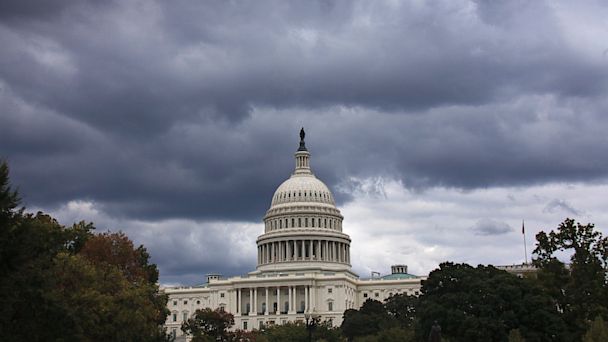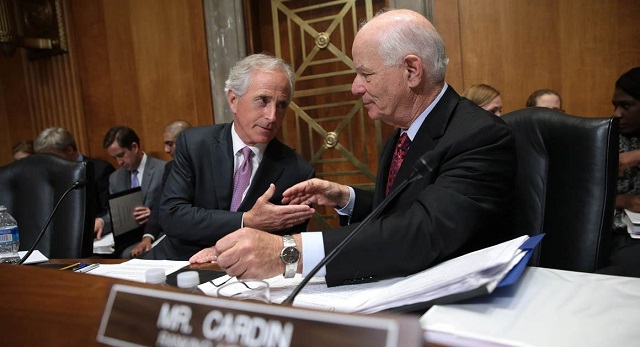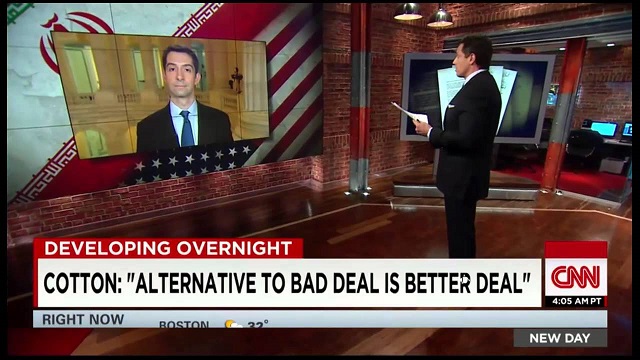Stormy U.S. Senate Armed Services Committee Hearing on Iran Nuke Deal
The Administration rolled out its “A Team” of witnesses at the U.S. Senate Armed Services Committee hearings on July 29th, chaired by Chairman Arizona Republican Senator John McCain. The Hearing addressed national security issues arising from the Iran nuclear pact scheduled by a Congressional vote on or before September 17th under the term of the Iran Nuclear Agreement Review Act. Yesterday’s hearing was the last in a series of House and Senate sessions prior to the summer recess adjournment starting Thursday, July 31st. Congress reconvenes following the Labor Day holiday giving less than 10 days for additional hearings before the vote to either accept or reject the Iran nuclear pact. Public opinion poll taken during the current series of Congressional shows a majority of Americans tilting towards asking Congress to reject the pact. The issue is how many of the undecided 13 Democratic Senators and over 30 Democratic Representatives will decide if a negative vote will be veto proof, given a threat by President Obama.
The panel of witnesses included, Secretary of State John Kerry, Energy Secretary Earnest Moniz, Treasury Secretary Jack Lew, Defense Secretary Ashton Carter and outgoing Chairman of the Joint Chiefs of Staff, Army Gen. Martin Dempsey. While questions naturally arose about the credibility of maintaining a military option, there was a tough grilling of Secretary Kerry and Secretary Moniz by Arkansas Senator Tom Cotton on the secret side deals between the UN nuclear watchdog agency, the International Atomic Energy Agency (IAEA), and the Islamic Republic of Iran over prior military developments.
DefenseNews reported the comments of Secretary Carter and Gen. Dempsey on military capabilities:
“It’s important that we have an agreement and it be verifiable, and that we keep doing what we need to do: Defend our friends and allies, remain strong in the Gulf — frequent navigation, ballistic missile defense, all the things that we’re doing, and the agreement doesn’t limit us in any way,” Carter said.
Indeed, “military options remain,” Dempsey said, though a negotiated settlement provides a more “durable” solution, as well as time to work with local partner nations to address Iran’s activities. Dempsey said there are a series of initiatives with Israel and the Gulf Cooperation Council to that effect.
Exercising airstrikes to take out Iran’s nuclear capability would disrupt its program by several years, Dempsey said. However analysis suggests it would also provoke Iran to “counter our presence in the region at every opportunity and use these other malign activities they have.”
That led to exchanges with Senators Roger Wicker (R-MS) and Joni Ernst (R-NE). Ernst like Senate panel colleague Sen. Tom Cotton (R-AK) is a former combat veteran who served in Iraq:
Sen. Roger Wicker, R-Miss., characterized Dempsey’s brief opening statement, as a “tepid endorsement” of the accord and “damning disagreement with faint praise,” which Dempsey disputed, saying he agreed with the deal.
His statement was neither “tepid nor enthusiastic, but pragmatic,” Dempsey said. His input in the deal was sought “episodically,” his final recommendation given weeks before negotiations concluded. At least in part, his recommendation was to keep pressure on Iran relative to ballistic missiles and arms trafficking for as long as possible.
Challenged by Sen. Joni Ernst, R-Iowa, over the president’s assertion that the US faces a choice between an Iran deal or a resolution by force — which Ernst characterized as “war” — Dempsey said he had not said anything to that effect to the president.
“We have a range of options, and I hope to present them,” Dempsey said. “As long as we agree, military strikes on a sovereign nation are an act of war, but there are things between here and there.”
Sen. Cotton was on top of his game engaging in the most withering Q&A with Secretary Kerry and Energy Secretary Moniz about their knowledge or the lack thereof concerning the so-called secret IAEA side deals on prior military nuclear developments (PMD). Late he engaged Gen. Dempsey during a discussion of exhibits to corroborate the lethality of Iranian IEDS used to kill American service personnel in Iraq. Dempsey lent the impression he was less inclined to be a booster of the Iran nuke deal. Cotton is both a veteran of combat in Iraq as a former U.S. Army officer and a Harvard Law School graduate and admitted lawyer
Cotton, like any good prosecutor, secured the facts that bolstered his line of questioning to elicit a response he was seeking for the Committee record. Prior to this Armed Services Hearing, Cotton and Kansas Republican Congressman Mike Pompeo had flown to Vienna to confer with IAEA officials uncovering the alleged secret side deals on investigation of Iranian compliance with prior military developments in their nuclear program (PMD).
 Kerry and Moniz, when queried about whether they had either knowledge of or read the IAEA secret side deals on PMD, adopted what in TV land is the fabled Sergeant Schultz defense from the 1960’s TV WWII Nazi prison camp comedy series, “Hogan’s Heroes” – “I know nothing” They simply fobbed it off saying that someone like Undersecretary of State Wendy Sherman may have glanced through these documents. Just indicates that the Administration either elected not to conduct due diligence or used the ploy that those agreements were confidential between the IAEA and Iran, that as Cotton pointed out “the Ayatollah read”.
Kerry and Moniz, when queried about whether they had either knowledge of or read the IAEA secret side deals on PMD, adopted what in TV land is the fabled Sergeant Schultz defense from the 1960’s TV WWII Nazi prison camp comedy series, “Hogan’s Heroes” – “I know nothing” They simply fobbed it off saying that someone like Undersecretary of State Wendy Sherman may have glanced through these documents. Just indicates that the Administration either elected not to conduct due diligence or used the ploy that those agreements were confidential between the IAEA and Iran, that as Cotton pointed out “the Ayatollah read”.
Former IAEA deputy director Olli Heinonen, who is now a Senior Fellow at the Harvard Belfer Center for Science and International Affairs, provided the answers in a report by Armin Rosen of Business Insider. Heinonen in an email said:
“According to the IAEA rules and practices such documents could be made available to the members of the IAEA Board”. Heinonen said the IAEA secretariat could not divulge these side agreements to other member states on its own initiative. But there are two ways US diplomats could access them. In one scenario, Iran would agree to divulge the documents: “Iran can make it available by asking to distribute it as an [Information Circular] document to all IAEA member states as they did with the 2007 Work Plan,” Heinonen said, referring to a publicly available agreement between the IAEA and Iran on nuclear safeguards.
US diplomats could also view these side agreements if a member state of the IAEA’s 35-member Board of Governors requests their distribution.
Such a move would stand a decent chance of success: “If a board member asks it and others resist the distribution … this can be overcome by a vote,” Heinonen said. “Simple majority is enough, and no vetoes exist in the IAEA system. The board can also request the whole document to be made public. Such a request could be best done by a country which is not part of the JCPOA process; my favorite is Canada.”
Cotton showed the witness panel two exhibits graphically portraying the effects of an Iranian developed shaped charge IED that were used to kill 500 American service personnel in Iraq. Gen. Dempsey acknowledged what they were and the devastating effects on Humvees, their occupants and other vehicles. Cotton then asks Kerry for his reaction. While, expressing appropriate sorrow for the loss of American lives, Kerry told the Senate panel that Quds force commander Qasem Soleimani who developed the shaped charge IEDs would not have sanctions removed. Reports by both ABC news and the Iranian FARS news agency have confirmed that Gen.Soleimani has been confirmed among a list of Iranian persons and institutions included in an annex to the JCPOA who will have both travel bans and asset restrictions lifted.
Watch this YouTube video of Senator Cotton’s Q&A at the Senate Armed Services Committee:
Senator Tom Cotton’s grilling of Kerry and Moniz revealed their lax conduct of due diligence on the IAEA side deals. They spent too much time being hounded with repeated demands for concessions by Javad Zarif in negotiations in Vienna. Instead, they should have sent aides over to the IAEA headquarters to ask about the side deals to provide a road map on prior military developments of Iran nuclear program. Senator Cotton and Rep. Pompeo did just that. Instead Kerry and the negotiating tea m basically said in so many words, we already know what Iran did, let’s move on and get with the program by approving the Iran nuclear pact. The video of Senator Cotton Senate Armed Services Committee Q&A should be widely shared on social media to inform undecided Congressional Democrats about why the Iran nuclear pact should be rejected.
Hearing by hearing testimony by the Administration “A Team” on the Iranian nuclear pact demonstrates how bad a deal Kerry and the Obama negotiating team crafted with the experts in playing multi-dimensional chess, the Islamic Regime in Tehran.
EDITORS NOTE: This column originally appeared in the New English Review.




